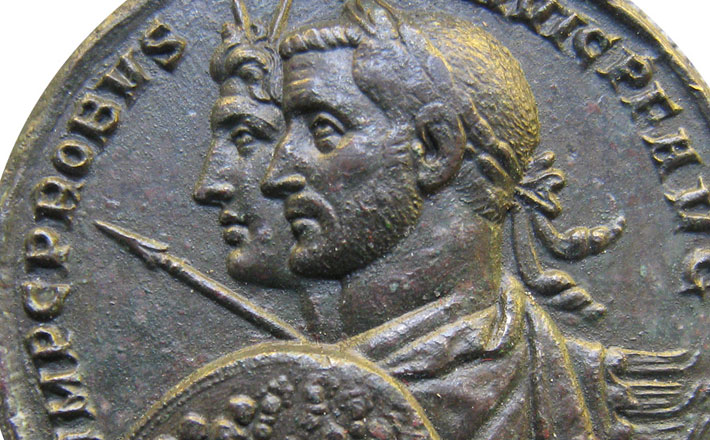Commentary on Exodus 33:12-23
The text of Exodus 33:12-23 is the culmination of a series of new revelations of God’s identity and names throughout the book of Exodus.
The series of unveilings of the divine begins when God first calls Moses at the burning bush to lead God’s people out of slavery. God begins by revealing a name that points to the past: “I am the God of your ancestors” (Abraham, Isaac, Jacob — 3:6, 15).
Next is a name that points to the present and the future: “I Am Who I Am” or perhaps better, “I Will Be Who I Will Be” (Exodus 3:14). The name plays on the Hebrew verb hayah (“to be”). The same verb lies behind God’s other special name YHWH (translated by the NRSV as “the LORD”). Watch to see what God will do in order to know who God is.
The Ten Commandments begin with an expansion of God’s name: “I am the LORD your God, who brought you out of the land of Egypt, out of the house of slavery” (Exodus 20:2). You are my people, says, the LORD, and I am “your God” who freed you from oppression.
Yet another expansion of the divine name declares God’s central motivation for this divine act of liberation: “I am the LORD their God, who brought them out of the land of Egypt in order that I might live among them” (Exodus 29:46). The whole point of God delivering Israel was to make it possible that God would be close and near, living “with us” in the midst of God’s beloved people. That’s why the book of Exodus spends so much time on the instructions (Exodus 25-31) and the building (Exodus 35-40) of the Tabernacle or tent sanctuary. The tabernacle is intended to be God’s home and dwelling place in the midst of God’s holy people.
God’s yearning to be “with” Israel and in their midst is the reason why the people’s rebellion in worshipping the golden calf in Exodus 32 is such a devastating event. Israel’s worship of the golden calf violated the first and important commandment about worshiping God alone and not worshiping idols (Exodus 20:3-5). This covenant-breaking act endangered God’s whole project of deliverance and dwelling in the midst of Israel. How can the powerful holiness and glory of the God of all creation live with and in the midst of a sinful people without the surging power of that divine holiness destroying the people (Exodus 33:3)? That is the key question with which Exodus 33:12-23 wrestles.
God and Moses in Intense Dialogue.
Moses succeeded in convincing God not to destroy the Israelites immediately after the golden calf rebellion (Exodus 32:7-14). Moses reminded God of the promise made to Abraham, Isaac, and Jacob that God would bring the Israelites to the promised land of Canaan. But how was God going to accomplish that without destroying them?
As an alternate plan, God proposed sending an “angel” instead of Godself to lead the people on their journey to Canaan (Exodus 32:34; 33:2-3). Moses, however, was not satisfied. Moses knew that the only thing that made the Israelites different from any other people or nation in the world is that God was in their midst and travels “with them” on their journey (Exodus 33:16). So Moses keeps pressing God with a number of arguments.
Moses appeals to the unique intimacy of the relationship between Moses and God (Exodus 33:12-13). Moses also reminds God that the Israelites are “your people” (Exodus 33:13b). After the golden calf incident, God had tried to put some distance between God and the people by referring to them as “your people,” Moses — not mine (Exodus 32:7; 33:1). Moses was having none of that! These are your people, God — not mine!
God then concedes that instead of the angel, “my presence will go” (Exodus 33:14). The New Revised Standard Version translation incorrectly reads verse 14 as “my presence will go with you.” But the phrase — “with you” — is not in the Hebrew. God agrees to go to Canaan but not “in the midst of” them, not “with” them, not “among” them. Maybe in front of, alongside, behind…but “not with us” (Hebrew ?immanu).
God with Us?
Moses remains unsatisfied. Moses insists to God that you must “go with us” (?immanu — Exodus 33:16). Amazingly, God finally agrees! “I will do the very thing that you have asked” (Exodus 33:17). Great! But how can a holy God live and travel “with us” without destroying God’s holy but sinful people? The answer. By reaching down and revealing yet another deeper layer of God’s name and identity.
Moses knows that the only basis for rebuilding the broken covenant relationship between God and people rests on who God is. The people’s hope does not rest on who the people are or what the people do. Without God, the Israelites are no better than the Egyptians (Exodus 33:4-6; see Exodus 12:35-36). As a result, Moses pleads to see and know more deeply God’s “ways” (Exodus 33:13), God’s “glory” (Exodus 33:18), God’s “goodness” (Exodus 33:19), God’s “name” (Exodus 33:19).
“I Will Be Gracious.”
Moses knows that Israel’s only hope lies deep down in God’s deeper self-discovery about God’s own character and name. Thus, God reveals to Moses yet another stage in the revealing of God’s name in Exodus. God who was “I Will Be Who I Will Be” (Exodus 3:14) is now revealed as “I Will Be Gracious to Whom I Will Be Gracious, and I Will Show Mercy on Whom I Will Show Mercy” (Exodus 33:19). The balance in God’s deepest character leans toward grace and mercy. God freely extends grace upon whomever God chooses. In this time and place on Mount Sinai, God chooses to love, forgive, and have mercy on the rebellious Israelites.
Moses and God have a uniquely intimate relationship (Exodus 33:11). On that basis, Moses has been able to nudge God step-by-step to reveal enough of God’s deep character to find a way forward that allows the holy, glorious, powerful, and good God to live “with us” (Immanuel) without destroying us, sinners though we may be. The next chapter will continue with God’s further explication of the divine name that continues to highlight the priority of mercy, forgiveness and grace in the deep character and name of God (Exodus 34:6-7).
The Mystery of God Lingers.
The text closes with God’s announcement that God will physically pass by Moses in the form of a divine body (Exodus 33:21-23). As God passes by, “you shall see my back; but my face shall not be seen.” Moses will be privileged to see something no other human has seen about God. Yet even Moses will not see or know all there is to know about God. This is an amazing and unprecedented encounter between a human and God. But a part of God’s ways, glory, goodness, and name (the face of God) will remain unknown, unseen. Dimensions of God’s ways in the world will remain mysterious, elusive, and incomprehensible. What we do know of God’s supreme love and mercy, however, is sufficient for the journey to continue.
Preaching the Text.
The preaching possibilities of this singularly important Old Testament text are numerous. The ever unfolding names of God. The character of God that always leans toward mercy and grace. The capacity of human prayer and advocacy for others to move God. The consistent yearning of God to be Immanuel — God with us (Isaiah 7:14). In Exodus 33, we hear a powerful echo to a future witness to the unfolding character and name of God: “And the Word became flesh and lived among us, and we have seen his glory … full of grace and truth (John 1:14).


October 22, 2017